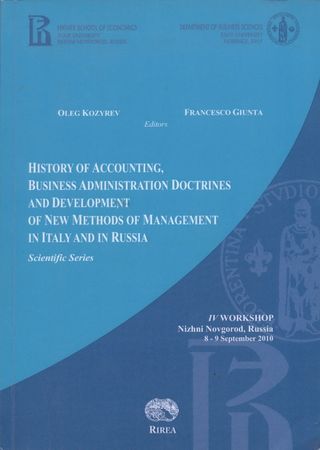?
Tourism in Russia: its current status and economic impact
P. 146–169.
В статье дается краткая характеристика текущего состояния сферы туризма в России, рассматриваются показатели, характеризующие вклад туризма в экономику России в сопоставлении с рядом стран Восточной Европы, проводится количественная оценка мультипликативного эффекта туристских расходов для экономики России. Для анализа использованы данные Росстата и Всемирного совета по туризму и путешествиям (WTTC).
М.: Медиа-ПРЕСС, 2025.
Урал -- яркая и особенная территория во многих смыслах. Горная система даже своей геометрией контура выбивается из привычности. Горы Урала, возможно, единственные в мире, которые послужили сердцевиной формирования крупного экономического района, остающегося до сих пор индустриальным ядром страны. Симбиоз городского, промышленного Юга и девственного природного Севера -- тоже особенность Уральских гор. В книге географы предтавляют ...
Добавлено: 15 декабря 2025 г.
Михайлова А. М., Манина В. А., Неяскина Ю. Ю. и др., Вестник Санкт-Петербургского университета. Серия 12: Социология 2025 Т. 18 № 1 С. 54–71
Существующие исследования требований к профессии показывают, что взрослым работающим людям на работе необходимо обладать набором таких надпрофессиональных умений, или универсальных компетенций, как, например, решение задач, критическое мышление, креативность, адаптивность и др. При этом основное исследовательское поле, как и прикладной вопрос, заключается в том, насколько заявленные как международными организациями, так и профессиональными стандартами компетенции являются не ...
Добавлено: 10 декабря 2025 г.
Дощатов А. А., Экономические исследования и разработки 2025 № 5 С. 47–58
Научная статья посвящена исследованию стратегического управления в сфере туризма в рамках Евразийского экономического союза. Проанализированы текущее состояние, проблемы и перспективы правового и административного регулирования туристической деятельности на уровне Евразийского экономического союза. В работе рассматриваются основные нормативно-правовые акты, определяющие основы регулирования туризма в евразийском объединении, выявляются существующие пробелы и противоречия в законодательстве, а также анализируются механизмы ...
Добавлено: 21 ноября 2025 г.
Баскакова Е. Ю., Сизова И. А., Псковский регионологический журнал 2025 Т. 21 № 4 С. 145–166
Цифровые технологии всё глубже проникают во все сферы. Не стала исклю чением и сфера туризма. Исследования в этой области подчёркивают важность цифровизации для развития туризма как в условиях форс-мажора (такие глобальные кризисы как пандемия, экстремальные природные явления, различные проблемы с транспортной инфраструктурой или конфликты), так и в условиях тотальной цифровизации. Цифровизация позволяет создавать виртуальные туры, ...
Добавлено: 19 ноября 2025 г.
Центр конъюнктурных исследований (ЦКИ) Института статистических исследований и экономики знаний Национального исследовательского университета «Высшая школа экономики» представляет информационный обзор, характеризующий ключевые тенденции, сложившиеся в туристической отрасли, а также организациях, оказывающих санаторно-курортные услуги, по итогам III кв. 2025 г. В работе также представлены краткосрочные прогнозные тенденции внутреннего, выездного и въездного туризма в октябре-декабре 2025 г.
В обзоре использованы ...
Добавлено: 14 октября 2025 г.
Канаев Е. А., Гараева А. Р., Southeast Asia: Actual Problems of Development 2025 No. 2(67) P. 66–78
В статье проводится анализ возможности превращения Юго-Восточной Азии в единое пространство цифрового маркетинга посредством развития глобальных цепочек стоимости (ГЦС) в туристическом секторе. Выявлены основные потребительские тренды в ЮгоВосточной Азии, рассмотрена степень зрелости цифрового мышления потребителей государств региона, дана оценка процессу формирования туристических ГЦС и целесообразности их оснащения цифровыми инструментами. С точки зрения авторов, поскольку страны ...
Добавлено: 3 августа 2025 г.
Маркин М. Е., Vishnyakova V., Regional Research of Russia 2025 Vol. 15 No. 1 P. 124–131
The article raises the question of how holding a major sporting event in a relatively small regional center changes the business environment for local businesses. Saransk serves as an empirical example, the capital of the Republic of Mordovia, which in 2018 became one of the host cities of the FIFA World Cup. The research methodology ...
Добавлено: 24 июня 2025 г.
Самара: ООО НИЦ «Поволжская научная корпорация», 2025.
В монографии «Концептуальные основы развития национальной инновационной системы России: структурно-технологическая модернизация отечественной экономики, социально-экономические и технологические факторы развития» авторы рассматривают поставленную исследовательскую проблему в разрезе пяти глав: концептуальные и методологические основы развития национальной инновационной системы России, структурно-технологическая модернизация отечественной экономики: социально-экономические и технологические факторы развития, переходное финансирование энергоперехода в странах ЕАЭС и БРИКС, внешняя торговля ...
Добавлено: 29 апреля 2025 г.
Самара: ООО НИЦ «Поволжская научная корпорация», 2025.
В монографии «Теоретические и методологические основы анализа и моделирования пространственного развития экономики России: ускорение темпов экономического роста и технологического развития» авторы рассматривают поставленную исследовательскую проблему в разрезе пяти глав: концептуальные и методологические основы анализа и моделирования пространственного развития экономики России, ускорения темпов экономического роста и технологического развития; анализ и моделирование пространственного развития: ускорение темпов экономического ...
Добавлено: 29 апреля 2025 г.
Vuković D., Zobov A., Degtereva Ekaterina A., Journal of the Geographical Institute Jovan Cvijic SASA 2022 Vol. 72 No. 1 P. 111–116
Добавлено: 11 марта 2025 г.
Клубная туристская деятельность как средство формирования социально-культурной активности подростков
Мищенко Д. С., Грибкова Г. И., В кн.: Наука и технологии: актуальные вопросы, достижения, инновации.: [б.и.], 2018. С. 219–225.
...
Добавлено: 24 января 2025 г.
Мищенко Д. С., В кн.: Развитие социально-культурной деятельности в условиях столичного мегаполиса: теория и практика.: М.: [б.и.], 2019. С. 240–246.
...
Добавлено: 24 января 2025 г.
Valentina Sergeevna Morozova, Dorzhi Dondokovich Dondokov, China Report 2024 Vol. 60 No. 3 P. 235–249
Добавлено: 18 января 2025 г.
NY, Oxon: Routledge, 2025.
Добавлено: 1 декабря 2024 г.
Морозова В. С., Dondokov D. D., China Report 2024 Vol. 60 No. 3 P. 235–249
Добавлено: 30 ноября 2024 г.
Мурманск: Мурманский арктический государственный университет, 2021.
Сборник материалов подготовлен по результатам работы студенческой научно-практической конференции «Экономика. Менеджмент. Арктика», проведенной в рамках Декады науки в Институте креативных индустрий и предпринимательства ФГБОУ ВО «Мурманского арктического государственного университета». Представленные материалы охватывают широкий спектр вопросов в области туризма, менеджмента, логистики, образования, управления персоналом, дизайна, урбанистики и могут быть полезны для научных работников, преподавателей, аспирантов, студентов ...
Добавлено: 1 ноября 2024 г.
Рахманова Л. Я., Журнал социологии и социальной антропологии 2024 Т. 27 № 2 С. 116–151
Рассматривая неочевидные мозаичные переплетения повседневной жизни местных жителей и практик туризма в отдаленных районах Томской области, автор подвергает ревизии понятие «паттерн удаленности» в интерпретации Кэролин Хамфри (2015), который формируется именно в «провинциальном» постсоциалистическом контексте в оппозиции к пространственным формам, диктуемым метрополией. Серия парадоксов окружает специфическую индустрию туризма в Томской области: отрицая связность, простоту доступа к территории и прозрачность, местные ...
Добавлено: 18 июля 2024 г.
